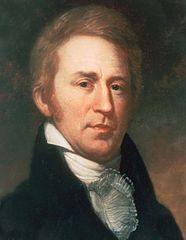Augustus (born Rome, 63 BC; died Nola, Italy, August 19, 14 AD) was a ruler of ancient Rome.
Bruce Brooks (born Richmond, Virginia, 1950) has written at least twenty books for children and young adults. His book Moves Make the Man earned a 1985 Newbery Honor Award, and What Hearts received a 1993 Newbery Honor Award.
William McGuffey (born Washington County, Pennsylvania, 1800; died Charlottesville, Virginia, May 4, 1873) was an educator and author. He penned the McGuffey Readers, a series of books that taught reading to children. At least 122 million books were sold between 1838 and 1960. Children can view the text of some of these readers at: Project Gutenberg.
Victoria Woodhull (born Homer, Ohio, 1838; died Norton Park, Bremmons, Worcestershire, England, June 10, 1927) was an advocate of women’s rights. She was the first woman candidate for the presidency. She ran for president against Ulysses S. Grant, although women did not have the right to vote. Children could learn more at: Victoria Woodhull.



